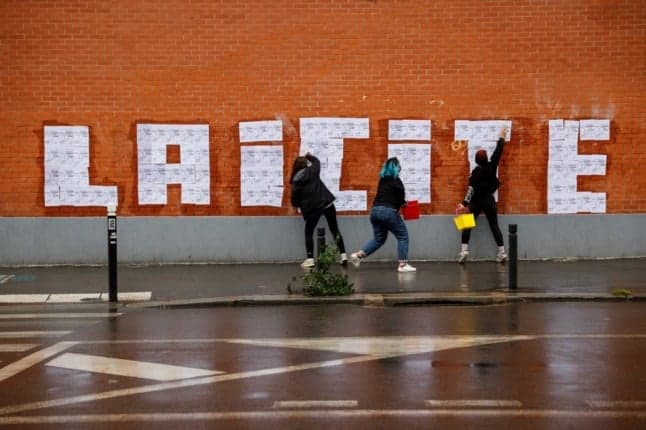France sets up 'office of laïcité' to defend its secular ideals

The complex and frequently-misunderstood concept of laïcité - secularism - is set to be reinforced with the creation of a new office designed to oversee the application of one of the fundamental principles of the French republic.
Prime minister Jean Castex announced on Thursday the creation of a new inter-ministerial committee on secularism which will eventually evolve into the bureau de la laïcité.
Its role will be to provide extra training to state employees on exactly what laïcité is and what it does and does not allow, and to rule on disputes over the application of the principle of state secularism.
The creation of the office comes as a new bill aimed at 'strengthening republican principles' and cracking down on extremism makes its way through parliament.
READ ALSO What is actually contained in France's new law against Islamic extremism
A key principle of the French state since its adoption in 1905, laïcité is poorly understood outside France, but the ideas of secularism are also often misunderstood - sometimes deliberately for political reasons - inside the country as well.
The basic principle of the law is that everyone in France is free to follow whatever religion they choose, but that the French state itself remains strictly neutral and religion plays no part in the business of the state.
This rules out, for example, Christmas nativity scenes in town halls or prayers in schools. It also means that agents of the state - anyone on the public payroll - cannot display any signs of their religion such as wearing the Muslim headscarf while at work, while religious symbols cannot be displayed in state buildings including schools.
It does not, however, extend to private businesses - so shops can and do put up Christmas decorations - or public spaces - so that wearing a Muslim scarf on the street or in a shop is perfectly legal.
Nevertheless, the lack of a simple, concise definition means that many people remain confused about the principle.
This is not helped by some deliberate distortions of the principle for political reasons, where it is particularly used to attack Muslim women.
READ ALSO What does laïcité really mean in France?
Comments
See Also
Prime minister Jean Castex announced on Thursday the creation of a new inter-ministerial committee on secularism which will eventually evolve into the bureau de la laïcité.
Its role will be to provide extra training to state employees on exactly what laïcité is and what it does and does not allow, and to rule on disputes over the application of the principle of state secularism.
The creation of the office comes as a new bill aimed at 'strengthening republican principles' and cracking down on extremism makes its way through parliament.
READ ALSO What is actually contained in France's new law against Islamic extremism
A key principle of the French state since its adoption in 1905, laïcité is poorly understood outside France, but the ideas of secularism are also often misunderstood - sometimes deliberately for political reasons - inside the country as well.
The basic principle of the law is that everyone in France is free to follow whatever religion they choose, but that the French state itself remains strictly neutral and religion plays no part in the business of the state.
This rules out, for example, Christmas nativity scenes in town halls or prayers in schools. It also means that agents of the state - anyone on the public payroll - cannot display any signs of their religion such as wearing the Muslim headscarf while at work, while religious symbols cannot be displayed in state buildings including schools.
It does not, however, extend to private businesses - so shops can and do put up Christmas decorations - or public spaces - so that wearing a Muslim scarf on the street or in a shop is perfectly legal.
Nevertheless, the lack of a simple, concise definition means that many people remain confused about the principle.
This is not helped by some deliberate distortions of the principle for political reasons, where it is particularly used to attack Muslim women.
READ ALSO What does laïcité really mean in France?
Join the conversation in our comments section below. Share your own views and experience and if you have a question or suggestion for our journalists then email us at [email protected].
Please keep comments civil, constructive and on topic – and make sure to read our terms of use before getting involved.
Please log in here to leave a comment.